Our subject tonight?
The Squirrels. Better still— The Squirrels at Maryland Ensemble Theatre as the penultimate production of their 2023/2024 main stage season. Written by Robert Askins (Hand To God) and Directed by Julie Herber…well… buckle up, you discerning patrons of the arts, because this one’s a doozey. Hell— I’ll say it. It’s nuts!
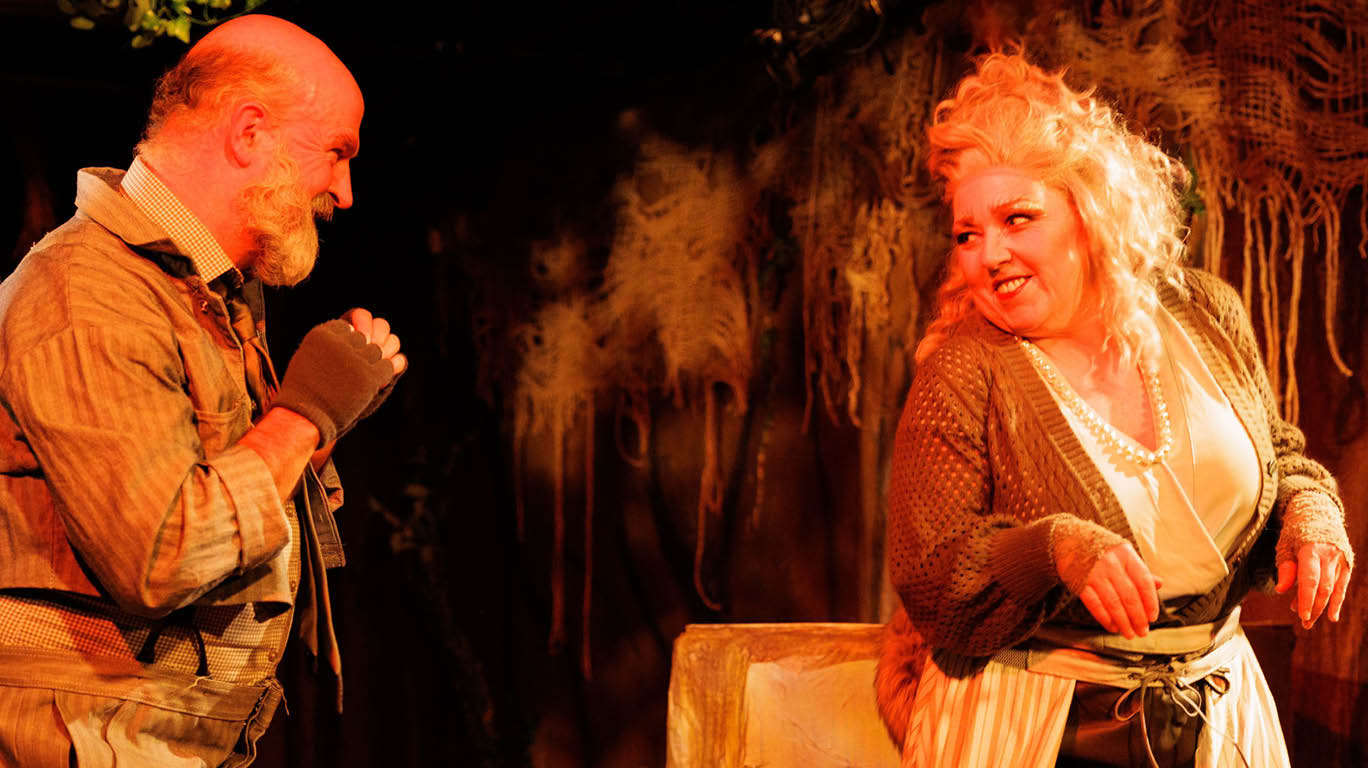
Playwright Robert Askins is wringing audiences in Frederick through the high-octane spin-cycle of this satirical washing machine. The play itself is both edgy and absurd, ridiculous yet poignant and disturbingly relevant. It’s got vibes and throughlines of Urinetown without all the pithy lyrics and emotionally dissonant music. But Askins excels in wrapping topical issues of humanity— racism, classism, sense of being ‘othered’, political corruption, fascism, socialism, and things of the like— into this whacky, off-kilter world of— you guessed it— squirrels. Actual, mucking squirrels. With fur. And tails. Commence the chaos and absurdity all whilst subliminally being exposed to real issues. What’s brilliant about Askins’ work is the way in which he’s able to push these subjects almost to an absurdist extreme— because of the Squirrel-fur in which he’s wrapped around the narrative— and yet it can’t ever truly be taken too seriously because— well— squirrels. It’s dynamic and ludicrous all at once. There’s a lot to unpack with Askins’ writing, particularly in the way he laces ‘squirrel’ into the vernacular of what’s being said (both metaphorically and physically) but ultimately the show works as both an evocative piece of theatre and as an unhinged comedy; enjoy it at face value or dig deeper and explore your own personal relationship with the topics being presented.
From the moment you step into the main stage space, Set Designer David DiFalco is transporting you to the magical-realism realm of The Squirrels, opening up a veritable playground for the six actors to play upon and making excellent use of the space as a whole. DiFalco masks the load-bearing support beam-pole as the central ‘tree’ and rigs up all sorts of fun branches and leaves through the ceiling, which get some pretty neat usage throughout the performance as the world of The Squirrels gets blown apart by its own devices. DiFalco’s set has this Fern Gully feel to it with more earthen tones and a few oversized (but completely appropriate if you’re a squirrel) furnishings— like the desktop-table made from a matchbox or the catfood-tin-sofa-seat. The set is augmented by Will Heyser-Paone’s lighting design, which is executed both with neutralizing effects and dramatic ones. Particularly near the performance’s end when we get pulsing strobes and some red washes, you get the sense that Heyser-Paone understands the emotional intensity the play is building toward and saves some of those lighting effects accordingly.
The costumes for this show are off the chain; parallelling the wildly unhinged narrative and overall direction of the script. Designer Cody Gilliam has given us big, fully-fluffed squirrel tails in both grey and red (to represent the Grey Squirrels and the Fox Squirrels respectively) but also given us the illusion of a bohemian/war-time aesthetic with the way the rest of the costumes are structured. The tails may be wired onto the actors backs and move almost free-form but these actors are not wearing full-on fur-suits. There are patches of colored fur like accoutrements adorned here and there, but for the most part it’s this hybrid of realistic human clothing and some insanely impressive wig and makeup design that drives home the zany nature of this show’s aesthetic. Here is where a call to— nuts— is called for; properties designer Lori Boyd has done an outstanding job of making dozens of nuts, as well as a pinecone or two, some realistically looking juicy-thick sap, and a bunch of other unique, hand-crafted pieces that fit the bill for this production. You could spend half the show just admiring both Boyd and Gilliam’s handiwork if you weren’t so caught up in the narrative and the explosively dynamic performances.
The show’s sound designer, Kevin Lloyd, also brings a world of nuance to the table for The Squirrels. There are tree-branch crashes, a lot of rumbling and shaking, but above all there is the chittering and other odd squirrel sounds that get looped throughout the performance, which enhances the effect of more squirrels than there are actors on the stage. And given that there are only six actors on the stage, nods of praise are also ringing out to Intimacy Coordinator Megan Behm (for all of those mucking muk scenes) and to Fight Choreographer Casey Kaleba; there is a particularly barbaric and intense scene between Sciuridae and Chordata, which has the authentic flavor of brutality and knock-down-drag-out-duel-to-the-death which really carries well in live-time action. In addition to this scene, the attack scenes (and the gory special effects that accompany them) are extremely well executed.
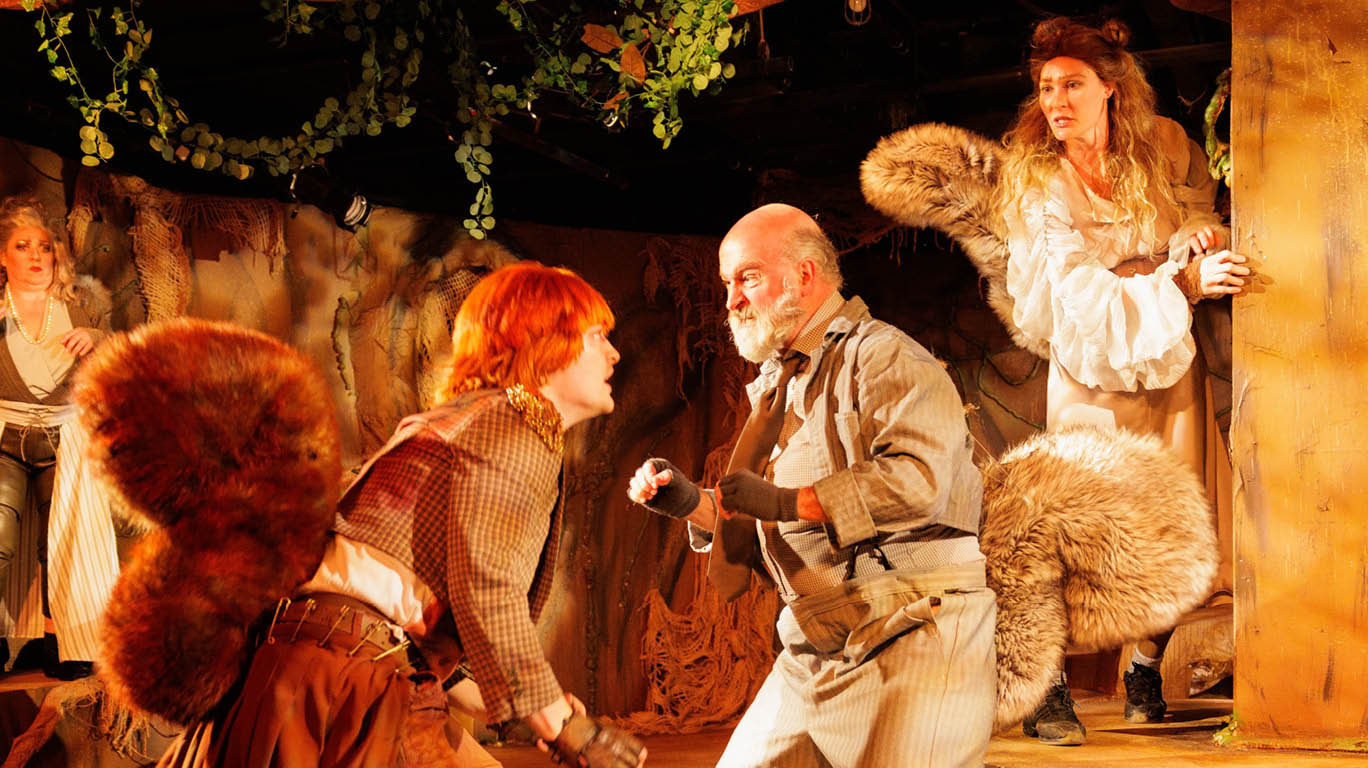
Director Julie Herber has put her signature movement based choreography all over this production. As David DiFalco’s set has several tiered layers, many of which move location throughout the performance, the tree-playground has created ample opportunity for the characters to move all over the place. Herber guides these movements with a precision laser, infusing them with the jittery and frenetic nature of squirrels being squirrels. Not only do these actors tweak and twitch their heads, eyes darting about, necks whipping and nuzzling and all the other behaviors and gestures that many of us have observed in our backyards, but the palpable, indefatigable current of energy surges through their movements every step of the way. Herber makes excellent use of the play space as a whole, constantly ringing any given pair of confrontational squirrels around the central tree, creating that illusion that these squirrels are chasing themselves in that helix-bending pattern up and down its trunk, as squirrels are wont to do. Stage Manager Olivia Pietanza keeps the scenic shifts moving quickly as well; they are underscored by some brilliant musical concoctions (again, Sound Designer Kevin Lloyd) which give you this feral, earthy mood-setting tone, every time that music is cued and pieces of the set fly into motion.
Truly moving as ensemble, the six performers— Courtney McLaughlin, Matthew Harris, Nicole Halmos, Shea-Mikal Green, Tad Janes, Willem Rogers— give you this story of war-time and terror; a story of a world (pardon the phrasing— a ‘squirrld’) that has always been one way and is now drastically changing. And what happens when the older, perhaps even feeble minded of that ‘old world’ just make a lot of noise because they’re confused and no longer recognize the world in which they previously lived but all their loud noise-making stirs up the younger generation with thoughts of fear and othered-ness? The narrative of The Squirrels is a shared mantel, each carried equally in part by McLaughlin, Harris, Halmos, Green, Janes, and Rogers; the mark of a perfect ensemble piece.
Balancing the humors and absurdity of The Squirrels against its topical severity and emotional sincerity is something that Director Julie Herber does superbly. In addition to keeping the actors, and thus the play’s momentum, perpetually in motion, Herber successfully keeps a disorienting tilt on the show’s overall expression, which helps keep the audience from diving down too deep a burrow of gravitas when it comes to the subject matters Askins is presenting in the play. There are certainly moments— Chordata’s decrying monologue toward the end or even some of Mammalia’s moments in pleading desperation— that take that emotional plunge, and Herber encourages the actors to embrace those moments fully and intensely but they never percolate or fester in that intensity for too long a period of a time, resulting in a finely tuned balance of ‘dark but poignantly punchy comedy.’
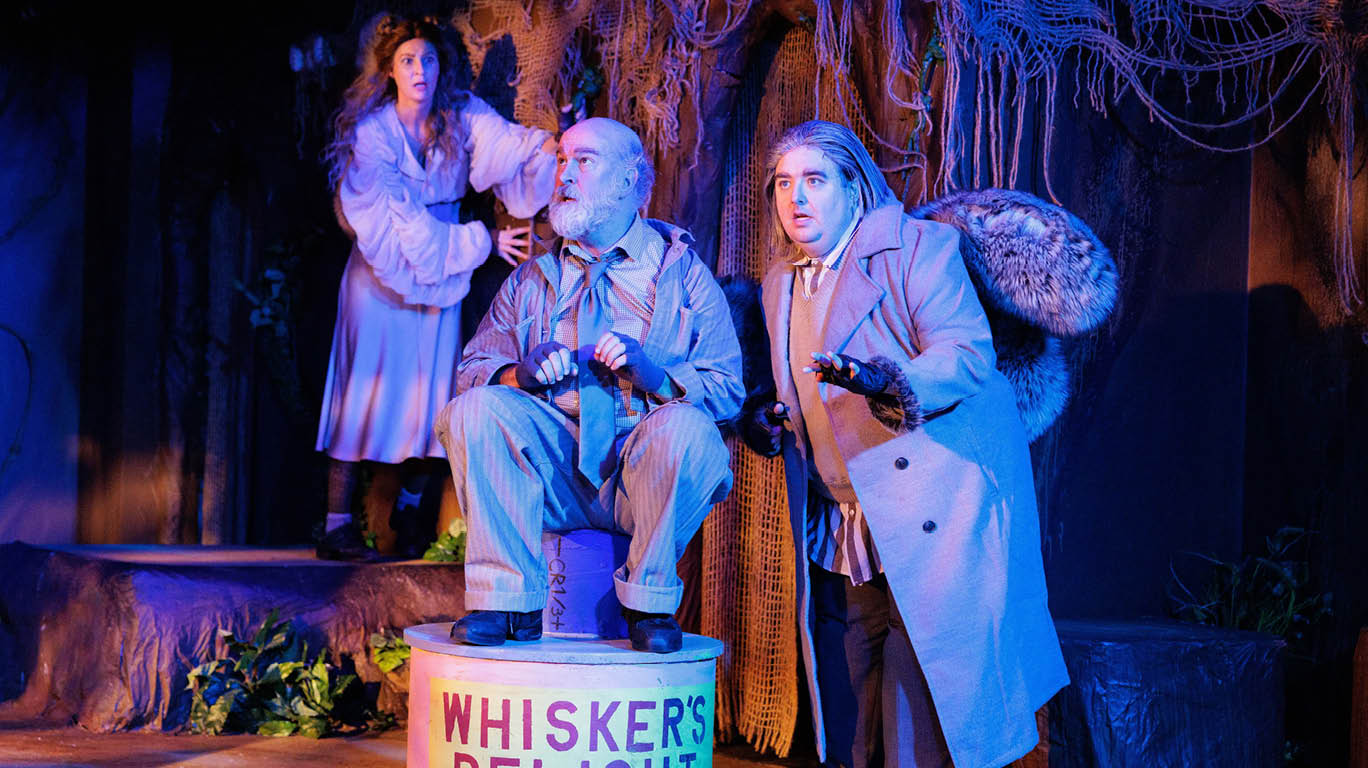
Matthew Harris may have one of the more difficult challenges in the performance as he doubles up in two characters— playing firstly and lastly an unnamed scientist, who launches and concludes the show, and then all during the narrative of the squirrel story, Sciuridae, a ruthless agitating antagonist who stirs up all sorts of nuts all along the way. Harris is a wonderfully engaging performer who tackles the audience with fervent enthusiasm when he first meets us in his scientist character. Practically frothing at the mouth with jubilant glee over the delights of squirrels, he’s gibbering on with infectious delight as he primes the house for what we’re about to experience. But let me be clear— no amount of his giddy, enthusiastic priming can prepare you for what actually goes down on that stage. Harris’ other character, Sciuridae, is an amalgamated presentation between a suave, sh*t-stirring agitator and a nefarious, racist-driven fascist who appears to exist solely to create discord and chaos. With vivacious facial expressions, Harris keeps the audience on their toes watching his various schemes unfold whilst in the role of Sciuridae.
Carolinensis, as played by the youthfully exuberant Willem Rogers, is the leader of the opposition, in a sense— if these squirrels could be broken down into such simple terms (I mean at one point we’ve got full-blown tactical assaults being carried out at the water’s edge and a Nazi-reminiscent black-acorn flag hanging from a ‘war-time-table’…) and is presented as both a protective leader and love-interest during the performance. Acting as the voice of reason who gets pushed far too far over the edge of sanity, Rogers’ tackles the character with both gusto and reverence, making for an interesting dynamic when the fighting really begins. There’s also a punctuative intensity to his comedic timing and delivery, especially near the end of the production when he engages with Sciurus, particularly when punching out lines like “are you serious right now?” and “are you kidding me?”
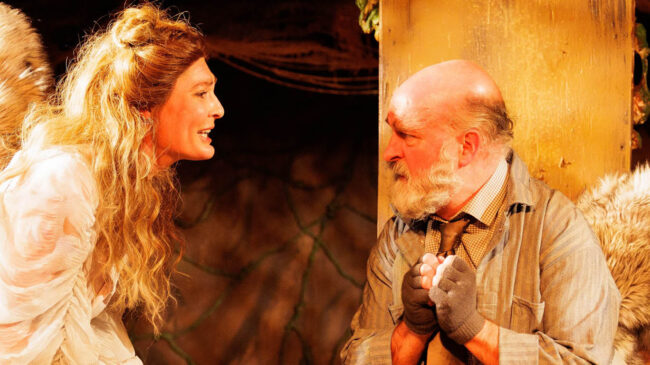
About twenty minutes into Robert Askins’ The Squirrels you’ll start to feel notes of King Lear, Macbeth, Hamlet, Romeo & Juliet, (and later Lysistrata just to name a few) and Courtney McLaughlin’s character of Chordata seems to be wrapped up in all of those woebegone women from those Shakespearean tragedies. If there’s one fault to this performance (if you can get beyond how unhinged, insanely feral, and just artistically unchained the show is) its that at times McLaughlin’s emotional intensity overcomes her vocal capabilities and some of her wording gets lost in the crying, melting-down, or screaming. This happens only a handful of times but it was enough so that I took note of it and only desperately want to hear exactly what is being said in those moments rather than just be drowned by her emotional tsunami-grade outpouring. The dynamic that McLaughlin brings to each of her squirrel-relationships is fascinating, particularly when she’s hiss-squeaking up in Rodentia’s face— the way true step-sisters might hiss and fuss at one another in the human world. McLaughlin also utilizes her spatial awareness— both of where the Chordata characters is on the set and in relation to how she interacts with others— to make this character’s journey more visceral. It’s an astonishing tactic and one that well-serves the narrative branch carried by the Chordata character.
Subtle at first in her existence but later baring a full armory of emotional dynamism, Nicole Halmos’ portrayal of Mammalia is beyond versatile. There is a snarky and sarcastic side, accompanied by cheekily timed eyerolls, to Halmos’ maternal figure, which gives way to the more frightened but overly protective mothering instincts as the play progresses. Much like the Chordata character, we get to see several unique faces of Mammalia depending upon who Halmos is on stage interacting with at the time. There is a tenderness, if not a pity, for Sciurus, the “muk of her life” and yet such low-burbling disdain for Rodentia. And a balance somewhere in-between for just about everyone else. The agonizing wails that Halmos’ lets loose at the end of the performance are brutal and harrowing, really striking a chord for the loss her character is experiencing when bad things come to their fullest fruition. Halmos also has some of the best ‘squirrel noises’ throughout the performance, though everyone is truly aces when it comes to executing and achieving these absurd sounds, all of which help to keep the play spinning frantically in its realm of chaos.
Fully engrossed in the world of the squirrel, Tad Janes is certainly a phenomenon to behold in the role of Sciurus. Meant to be the patriarch of the family, but turning out to be this feeble, misguided, bordering-on-senile curmudgeonly scared squirrel, Janes doesn’t dive into the role or plunge into it— he barrel bursts through it like the Kool-Aid man through the brick wall; completely destructive and intense energy with lots of comedy and a deep sense of ‘what the heck did I just watch?’ ever present at the edge of his portrayal. But there are levels to Janes intensity, which makes for a deliciously nuanced performance; its more than just bombacity and terror blended with craziness and fear; there are tiers of emotion that get delivered full-stop from Janes throughout this performance— it’s a dizzying roller coaster to try and keep up with all the nuanced transitions. And his hop-ups onto some of those elevated platforms are truly wild to behold. Janes possesses a rawness to the various emotional lanes that the Sciurus character runs around in, which makes his portrayal of this role that much more fascinating.
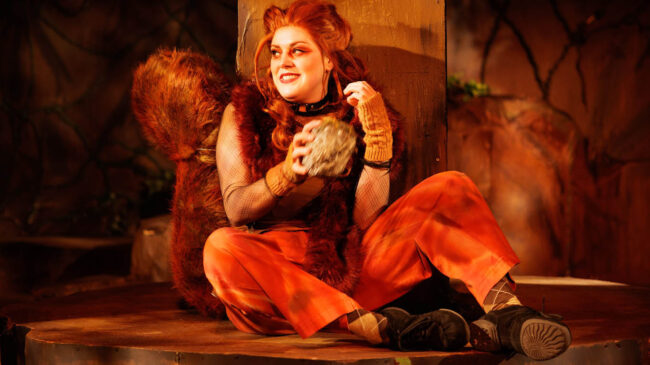
Sassy, over-sexualized and baring marks of both Iago, Lady M, and a few other rogue horses (squirrels? Did Shakespeare have any squirrels?) Shea-Mikal Green is a force to reckoned with in this production. A Fox Squirrel with mischief ever-present in both her mind and physicality, she was taken into the drey (squirrel nesting den/home) as a pup by Sciurus long before the story we witness plays out. That doesn’t stop her conniving, chaotic ways from ruling her stage-time. Green is both dynamite and dervish, sexuality and ferocity all wrapped up in one explosive Fox Squirrel and your eyes will be on her, regardless of who or what else is happening on stage. It’s difficult to describe the level of excellence to which Green elevates her character but it’s extremely intense, at times so over the top its more ethereal than believable— like a Shakespearean demon (Lady M comes immediately to mind) come to life— and ultimately creates for an exhilarating watch. What’s truly brilliant about her performance is that although she is intense, even when you can’t take your eyes off of her, you don’t feel like Green is pulling focus, in a negative way, from everything else that’s happening in the ensemble.
The play is explosive and dynamic and utterly off-the rails unhinged. But there are deep-seeded issues buried just below the squirrelly surface of this nutty dark comedy. Robert Askins’ work in the hands of Julie Herber and the Maryland Ensemble Theatre really is exemplifying how humanity is its own fire that will burn itself to the ground and have lasting impacts because of the behaviors, ideas, and chatters of a small few. Truly buckle up for this one folks, it’s a wild ride beyond compare, but deeply funny and really worth catching during its month-long run at The MET.
Running Time: 2 hours with one intermission
The Squirrels plays through April 28th 2024 on the Main Stage of the Maryland Ensemble Theatre in the Historic FSK Hotel building— 31 W. Patrick street in downtown historic Frederick, MD. For tickets call the box office at (301) 694-4744 or purchase them online.
